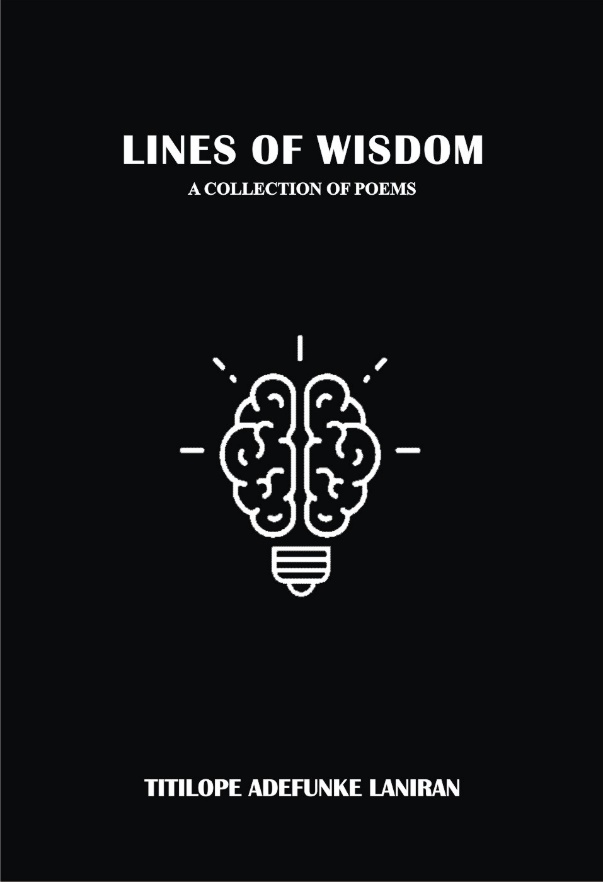‘Lines of Wisdom’ is a collection of fifty impressive and evocative poems written by Titilope Adefunke Laniran and published by OAK Initiative, a publishing arm of OAK Charity Initiative, a charity organisation aimed at supporting indigent students, widows and the fatherless in Africa.
Though this poetry collection is essentially on nature, it shelters some poems on other thematic areas of life, living, and death. Nevertheless, the poems here are brief, direct, and straight to the point. Brevity is the essential feature of poetry that distinguishes it from other genres of literature. The story that Chinua Achebe would write in 120 pages could be written by JP Clark in a page of poetry and convey the same ideas to the reader. The longest poem in this collection, ‘Growing Old’ has twenty lines while four poems, ’Know Yourself’, ‘The Hard Master’, ‘Family Bond’ and ‘The Mind’s Eye’ are the shortest ones with ten lines.
Poetry on nature is always fascinating, endearing and enduring regardless of the language and style the poet uses because the register of nature is ever poetic. And when a poet admonishes on life, living and death through the gifts of nature, s/he is only attempting to change our world for the better. Therefore, Titilope Laniran should be commended for attempting to change our world through poetry.
In this collection, some of the poems on nature are, ‘Nature’s Beauty’, ‘Breathe’, ‘A Lesson From the Rains’, ‘Accident of Nature’, ‘Time Moving’, ‘Mystique’, ‘Night and Day’, and ‘The Mind’s Eye’ among others.
In ‘Nature’s Beauty’ and ‘Breathe’, the Poet adds her voice to the ongoing advocacy campaign on the need to protect the environment to save our world from impending danger. From ‘Nature’s Beauty’ comes these lines:
“We destroy ourselves/When we destroy nature/For we ourselves are part of nature/With every act against nature/We shed some of our own beauty.”
But in ‘Breathe’, we are not only part of nature, but we are nature:“You are nature now/And nothing can stop you/Unless you stop breathing”
Other thing being equal, it is natural for human beings to grow old. Can growing old be an accident of nature? The Poet answers this question by saying, “You don’t stumble upon it/You walk into it”
Other poems on nature motivate and inspire us to live a dignified life until death comes calling. Death is also natural; it will come when it will. Death is neither ‘useless’ nor a state of ‘powerlessness’, but a process of ‘transfiguration’, and of ‘transformation’ from one state to another, the Poet explains this in a poem, ‘Death’. Live now and leave good memories behind, the Poet admonishes.
On the theme, ‘Memories’, about six poems pop up; ‘Paper and Memories, ‘Memories of the Past’, ‘Echoes of memories’, ‘The Chain of the Past’, ‘The Past’ and ‘Remember’. In ‘Paper and Memories’, what can hinder one from living a life to the fullest comes to the fore. But in ‘Memories of the Past, the goal of living in the present is ’To never lose the memories’ because memories are ‘the vault of treasures from the past’.
Human beings have ambitions, but they must listen to the echoes from the past and follow the sounds of melody that will ring the memories and propel those ambitions, the Poet opines in ‘Echoes of Memories’.
Titilope, the Poet, also explores the concept of ‘Fear’ to support her admonitions on living a purposeful life. In her explorative works on the concept, the poet enlightens the reader on the need to overcome the four-letter word, ‘FEAR’. Coincidentally, about four poems on fear feature in this collection; ‘Never Become Your Fears’, ‘Ignorance and Fear’, ‘Killing Fear’, and ‘Knowledge, Fear and Shadow’.
In ‘Never Become Your Fears’, Titilope poetically suggests that one should never run away from them, but ‘Descend upon your fears like mighty rushing water’. What breeds and nurtures fear most? Ignorance! But the moment fears are confronted, they either disappear like the mist when the sun rises or turn into fountain of opportunities:
“Ignorance gives birth to fear/Like a mother in labour/Delivers her offspring/Fear carries the imprint of ignorance/And ignorance nurtures/Fear to maturity.”
However, we must find a way of killing our fears. In ‘Killing Fear’, Titilope asks rhetorical questions on how to conquer fear. The best option is to kill fear with knowledge and allow the blood of ignorance ooze from its remains.
Killing our fears with knowledge requires we seek wisdom, and paradoxically we all know where to find it. It takes only the brave to really find wisdom. This is exactly what the Poet postulates in ‘The Paradox of Wisdom’ and ‘Brave Wisdom’ respectively. Even the brave needs ‘Motivation’, a fire that burns inside of us, inside of those who have tools to ignite it. Once it is allowed to burn within and not without, it leads to great happiness – fulfilling the ‘Purpose’ in life. Sometimes, for that happiness to occur, one needs to be lucky. ‘Luck’, according to the Poet, lurks around in plain sight, in the open, only for the brave to see clearly with wisdom.
In all, the Poet has attempted to change the life of the reader for the better by simply allowing nature to speak. It has spoken loud and clear to all and sundry, especially the lovers of poetry. Titilope while beating the drum of change has touched the liver of the drum. She has done it beyond the grasp of reason. Arranging the themes of the collection sequentially creates a spellbinding effect on the reader. Moreover, the images in the collection form patterns of related details that convey the ideas beyond what the images literally describe and create symbolic effects. Here is a collection of poetry that must be read by all and sundry.










